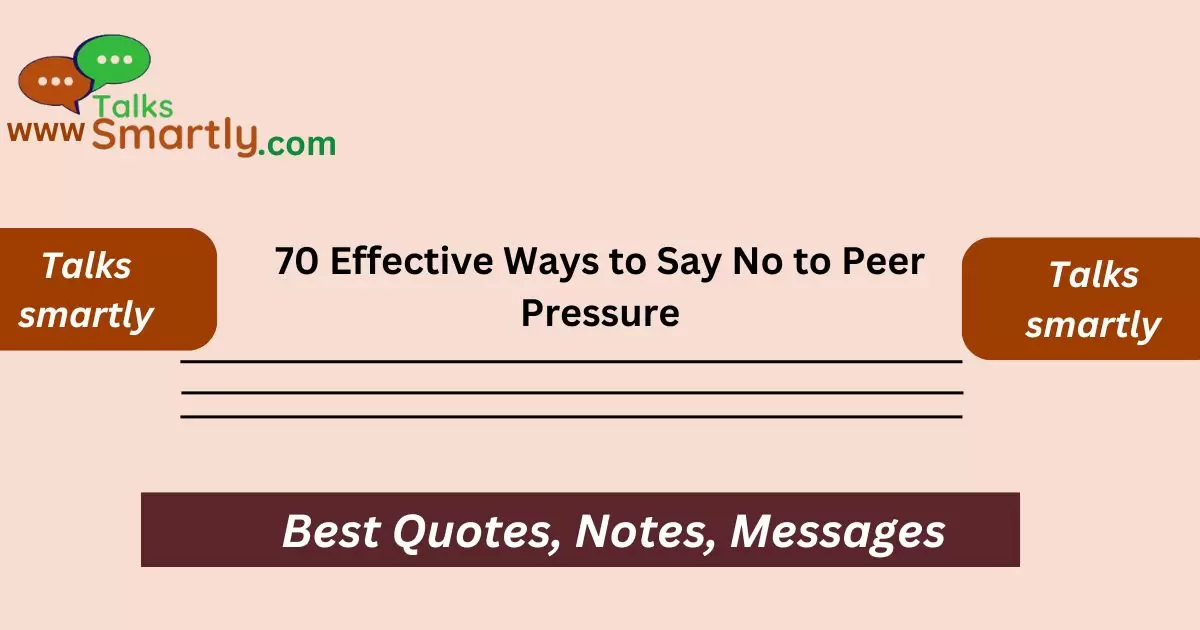Introduction
70 effective ways to say no to peer pressure and confidently navigate challenging situations. Learn practical strategies to stand firm and stay true to your values.
Handling peer pressure can be tough, but knowing how to say “no” effectively makes a big difference. This article offers 70 effective ways to resist peer pressure confidently. You’ll learn simple techniques to stay true to yourself.
Whether it’s setting boundaries or using positive self-talk, these tips will help you navigate challenging situations. Empower yourself to make choices that align with your values.
Take a moment to explore these 70 strategies and see which ones resonate with you. Practice using them in real-life situations to build your confidence. Share this article with friends who might also benefit from these tips.
Remember, standing firm in your decisions helps you stay true to yourself and resist peer pressure.
This article, titled “70 Effective Ways to Say No to Peer Pressure,” provides practical advice for managing social influence. It covers a range of strategies to help you assert your boundaries and make choices that reflect your values.
From understanding peer pressure to using humor and seeking support, you’ll find actionable tips to navigate peer pressure with confidence. Each method is designed to be easy to apply and relevant to everyday situations.
Understand Why Peer Pressure Happens
Understanding why peer pressure happens is key to effectively managing it. Peer pressure often arises from the desire to fit in and be accepted by others. It can stem from social dynamics where individuals seek approval or fear rejection from their peers.

This pressure can be particularly intense in group settings where conformity is valued, and individuals may feel compelled to go along with the majority to avoid standing out.
Recognizing these underlying motivations helps in identifying when you’re being influenced and empowers you to make decisions based on your own values rather than succumbing to external pressures.
Understanding the root causes of peer pressure allows you to navigate social situations more effectively and maintain your personal integrity.
70 Responses to Peer Pressure
Assert Your Own Values
Assert your own values by clearly identifying and standing by your personal principles. When you are confident about what you believe in, it becomes easier to make decisions that align with your values.
This self-awareness helps in resisting peer pressure as you have a solid foundation on which to base your choices. For example, if you value honesty, you might feel more comfortable refusing to engage in dishonest activities, even if pressured by others.
In challenging situations, refer back to your core values to guide your responses. This practice not only strengthens your resolve but also ensures that your decisions are consistent with who you are.
By communicating your values effectively, you can assert your position without coming across as confrontational or defensive.
Use a Direct “No”
When faced with unwanted pressure, using a direct “no” can be both effective and clear. This approach minimizes confusion and sets a firm boundary that is difficult for others to misinterpret.
For example, if a friend asks you to join an activity you’re not interested in, simply saying, “No, I’m not interested,” can effectively communicate your stance.
Being direct helps to avoid unnecessary discussions or justifications. It also reinforces your ability to make choices that are best for you without feeling the need to conform to others’ expectations.
Practicing this straightforward approach can build your confidence and assertiveness in various situations.
Express Your Feelings Honestly
Express your feelings honestly to help others understand your perspective and why you might be declining an invitation or request.
For instance, if you feel overwhelmed with your workload, sharing that you’re too busy to participate can lead to greater understanding and respect from others.
Honest communication fosters trust and openness in relationships. By articulating your feelings clearly, you not only maintain your boundaries but also build stronger connections with those who respect your honesty.
This method ensures that your decisions are based on genuine concerns rather than external pressures.
Suggest an Alternative Activity
If you’re not comfortable with a proposed activity, suggesting an alternative can be a helpful compromise. For example, if you’re invited to a party but prefer a quieter gathering, you might propose a movie night instead.
This approach demonstrates your willingness to engage in social activities while aligning with your preferences.
Offering alternatives shows flexibility and can help avoid conflict. It also provides a way to participate in social settings without compromising your personal comfort. This strategy can lead to more agreeable outcomes and maintains positive relationships.
Use Humor to Deflect Pressure
Using humor can be an effective tool to deflect pressure and lighten the mood. When someone tries to pressure you into doing something you’re not comfortable with, making a light-hearted joke can ease the tension.
For example, if someone insists you join a risky activity, responding with a humorous comment like, “I’m already on a diet from excitement,” can shift the conversation.
Humor can deflect pressure without causing offense. It helps in maintaining a friendly atmosphere while subtly reinforcing your stance. This approach also shows that you can handle peer pressure with grace and wit.
Explain Your Reasons
Explaining your reasons for declining an offer or request can help others understand your perspective. For instance, if you’re not able to attend an event due to prior commitments, explaining this can make your refusal seem more reasonable and less arbitrary.
Providing a rationale not only helps others accept your decision but also shows that your choice is thoughtful and considerate. This transparency fosters respect and can reduce any potential misunderstandings or negative reactions.
Be Confident in Your Decisions
Being confident in your decisions is crucial when dealing with peer pressure. Confidence comes from knowing your reasons and standing firm in your choices.
For example, if you decide not to participate in an activity because it conflicts with your personal goals, confidently stating your decision reinforces your commitment to your values.
Confidence projects strength and helps in managing others’ reactions. It also minimises self-doubt and reinforces your ability to make decisions that are best for you. Practising self-assurance can make it easier to navigate challenging social situations.
Seeking support from friends can be crucial when dealing with peer pressure. Friends who share your values can offer reassurance and practical advice, helping you feel more confident in your decisions.
Discussing your concerns with a trusted friend provides emotional support and alternative perspectives, making it easier to maintain your boundaries.
Their encouragement not only reinforces your choices but also helps you feel less isolated in challenging situations. Building a supportive network ensures you have a solid foundation to resist peer pressure and stay true to your personal goals.
Use “I” Statements
Using “I” statements can communicate your feelings and decisions clearly without sounding accusatory. For example, saying, “I feel uncomfortable with this situation,” rather than, “You’re making me uncomfortable,” helps express your personal perspective without blaming others.
This approach fosters open communication and reduces potential defensiveness from others. It also ensures that your decisions are understood as personal preferences rather than criticisms, which can make it easier to maintain your boundaries and manage peer pressure.
Focus on the Consequences
Focusing on the consequences of a decision can help clarify your stance and reinforce your choices. For instance, if you’re being pressured into a risky behavior, explaining the potential negative outcomes, such as legal trouble or personal harm, can illustrate why you’re choosing not to participate.
Highlighting consequences emphasizes the importance of making informed choices and can persuade others to respect your decision. This approach also strengthens your ability to resist peer pressure by making the stakes of your decisions more tangible.
Ask Questions to Deflect Pressure
Asking questions can deflect peer pressure by shifting the focus away from yourself. For example, if someone is pressuring you to join an activity, asking, “Why is this so important to you?” can redirect the conversation and give you time to consider your response.
This technique helps you avoid direct confrontation and allows you to evaluate the situation from a different angle. It also provides insight into others’ motivations, which can aid in making a more informed decision.
Reiterate Your Own Principles
Reiterating your own principles can reinforce your stance and remind others of your core values. For instance, if someone tries to pressure you into something against your beliefs, restating your commitment to your principles can help others understand your position.
By emphasizing your principles, you demonstrate consistency and conviction in your decisions. This approach reinforces your values and helps maintain your boundaries amidst peer pressure.
Engage in a Healthy Distraction
Engaging in a healthy distraction can provide a constructive way to avoid or manage peer pressure. For example, if you’re feeling overwhelmed by social pressures, participating in a hobby or physical activity can help you refocus and reduce stress.
Healthy distractions allow you to divert your attention and energy towards positive outlets. This technique helps maintain your well-being and supports you in managing peer pressure effectively.
Share Your Past Experiences
Sharing your past experiences can provide context for your decisions and help others understand your perspective. For example, if you’ve previously faced similar pressures and learned valuable lessons, discussing these experiences can illustrate why you’re making your current choices.
By sharing your experiences, you offer insight into your decision-making process and demonstrate that your choices are informed by past knowledge. This approach can foster empathy and respect from others.
Be Firm but Polite
Being firm but polite ensures that your decisions are respected while maintaining positive relationships. For instance, if you need to decline an invitation, doing so with a polite, “Thank you for the invite, but I must decline,” communicates respect and firmness.
This approach balances assertiveness with courtesy, helping you maintain your boundaries while avoiding unnecessary conflict. It reinforces your position without alienating others.
Use a Prepared Statement
Using a prepared statement can help you navigate peer pressure confidently. Having a clear, rehearsed response ready, such as, “I’ve decided not to participate because it doesn’t align with my goals,” can streamline your decision-making and reduce stress.
Prepared statements provide clarity and consistency in your responses. This technique helps you manage peer pressure with ease and ensures that your decisions are communicated effectively.
Explain How It Conflicts with Your Values
Explaining how it conflicts with your values can clarify why you’re making a particular choice. For example, if pressured to engage in behavior that doesn’t align with your ethical standards, articulating how it contradicts your values helps others understand your stance.
This explanation reinforces your commitment to your principles and helps others see your decision as a reflection of your personal beliefs. It also promotes mutual respect and understanding.
Avoid Being Defensive
Avoiding defensiveness helps you address peer pressure calmly and effectively. Instead of becoming defensive or confrontational, respond to pressure with composure and clarity. For example, if questioned about your decision, calmly stating, “This is what I’ve chosen for myself,” avoids escalating the situation.
Maintaining a non-defensive demeanor allows for constructive dialogue and reduces the likelihood of conflict. It also helps you stay focused on your decision without getting sidetracked by emotional reactions.
Reinforce Your Self-Worth
Reinforcing your self-worth strengthens your ability to resist peer pressure. Remind yourself of your values, strengths, and achievements, which can boost your confidence and resolve. For instance, if pressured to compromise on your principles, reflecting on your accomplishments and self-worth can reaffirm your choices.
Building self-worth helps you maintain a positive self-image and reinforces your ability to make decisions that are true to yourself. It also supports you in handling peer pressure with greater resilience.
Discuss Alternatives with Peers
Discussing alternatives with peers can provide a way to address peer pressure constructively. For example, if you’re pressured into a specific activity, suggesting alternative ways to spend time together, such as a different group outing, can help find a compromise.
This approach fosters collaboration and shows that you’re open to finding solutions that work for everyone. It also helps you maintain your boundaries while accommodating others’ preferences.
Take a Break from the Situation
Taking a break from the situation can provide you with the space needed to make thoughtful decisions and manage peer pressure. If you feel overwhelmed, stepping away from the immediate pressure and spending time alone can help you regain perspective.
This pause allows you to reflect on your choices and return to the situation with a clearer mind. It also helps you avoid making impulsive decisions under pressure.
Involve a Third Party if Necessary
Involving a third party can offer additional support and perspective when dealing with peer pressure. For example, if you’re struggling to resist pressure, bringing in a trusted friend or advisor can provide reinforcement and guidance.
A third party can offer objective advice and help mediate discussions, making it easier to handle peer pressure. This support ensures that your decisions are backed by a broader network of understanding.
Reflect on Your Own Beliefs
Reflecting on your own beliefs helps you stay grounded and make decisions that align with your values. For instance, taking time to consider how a decision fits with your personal beliefs can reinforce your choices and strengthen your resolve.
This reflection provides clarity and helps you stay true to your principles. It also supports your ability to manage peer pressure by ensuring that your decisions are consistent with your core beliefs.
Practice Role-Playing Scenarios
Practicing role-playing scenarios can prepare you for real-life situations involving peer pressure. By simulating different pressure situations with a friend or mentor, you can develop effective strategies and responses.
Role-playing helps you anticipate challenges and build confidence in handling peer pressure. This preparation ensures that you’re ready to respond assertively and maintain your boundaries in actual situations.
Seek Feedback from Others
Seeking feedback from others can provide valuable insights and support when managing peer pressure. Discussing your strategies and decisions with trusted friends or mentors can help you refine your approach and gain additional perspectives.
Feedback helps you understand how others perceive your decisions and can offer constructive advice. This process strengthens your ability to handle peer pressure and reinforces your decision-making skills.
Be Honest About Your Limits
Being honest about your limits ensures that others understand your boundaries and constraints. For example, if you’re unable to take on additional responsibilities, clearly communicating your limits can prevent misunderstandings and pressure.
Honesty about your limits fosters respect and helps others recognize your boundaries. It also supports you in making decisions that are manageable and true to your capabilities.
Acknowledge Their Perspective
Acknowledging their perspective helps build empathy and understanding in discussions about peer pressure. By recognizing others’ views, you can address their concerns while maintaining your own stance.
For example, if someone pressures you, saying, “I understand your viewpoint, but here’s why I can’t participate,” shows respect and clarity.
This approach facilitates constructive dialogue and helps others appreciate your perspective. It also demonstrates that you value their opinions while remaining committed to your own choices.
Suggest a Group Decision

Suggesting a group decision can shift the focus from individual pressure to collective agreement. For example, if pressured to join an activity, proposing a group discussion or vote can help balance opinions and reduce individual pressure.
A group decision-making process promotes collaboration and ensures that everyone’s views are considered. It also helps distribute responsibility and reduces the impact of peer pressure on any one person.
Avoid Using Drugs or Alcohol
Avoiding drugs or alcohol is crucial in managing peer pressure, especially in social settings. These substances can impair judgment and increase susceptibility to pressure. By steering clear of drugs or alcohol, you maintain clear decision-making abilities and resist unwanted influences more effectively.
This approach supports your ability to make thoughtful choices and reinforces your commitment to personal values. It also helps you stay in control of your responses and avoid compromising situations.
Remind Yourself of Your Strengths
Reminding yourself of your strengths can bolster your confidence and resolve in the face of peer pressure. Reflecting on your skills, achievements, and positive traits reinforces your self-worth and supports your decisions.
Acknowledging your strengths helps you stay motivated and assertive. It also provides a foundation for resisting peer pressure, as you’re more likely to trust and value your own judgment.
Take Responsibility for Your Choices
Taking responsibility for your choices demonstrates maturity and accountability. When you make decisions, own them fully and accept the consequences. For example, if you choose to decline an invitation, acknowledging that it’s your decision reinforces your autonomy.
Responsibility fosters respect from others and helps you stay true to your values. It also supports you in managing peer pressure by reinforcing your commitment to your choices.
Focus on Long-Term Goals
Focusing on long-term goals can help you resist immediate pressures and stay aligned with your aspirations. For instance, if pressured to engage in risky behavior, reminding yourself of your long-term objectives can reinforce your decision to stay focused.
Long-term goals provide motivation and perspective, helping you navigate peer pressure with a clear sense of purpose. This approach ensures that your decisions support your future success and well-being.
Maintain a Support Network
Maintaining a support network is essential in managing peer pressure. Surround yourself with friends, family, and mentors who respect your choices and provide encouragement. Their support can offer reassurance and strengthen your resolve when facing pressure.
A solid support network can also provide practical advice and alternative perspectives, helping you navigate challenging situations. This network plays a crucial role in reinforcing your decisions and ensuring that you stay true to your values and goals.
Reflect on Your Decisions
Reflecting on your decisions allows you to evaluate your choices and their alignment with your values. Taking time to consider the outcomes of your decisions and how they fit with your long-term goals helps reinforce your commitment and provides clarity.
Regular reflection supports better decision-making and enhances your ability to handle peer pressure. It ensures that your choices are consistent with your personal values and helps you make adjustments if needed.
Develop Coping Strategies
Developing coping strategies can help you manage peer pressure more effectively. Techniques such as deep breathing, positive visualization, or stress-relief activities can provide practical tools for handling pressure in the moment.
Effective coping strategies enable you to stay calm and focused, making it easier to assert your decisions and resist unwanted influences. This preparation ensures that you are better equipped to handle peer pressure without compromising your values.
Emphasize Your Integrity
Emphasizing your integrity reinforces your commitment to your personal values and principles. When faced with peer pressure, highlighting your dedication to ethical behavior and honesty demonstrates your commitment to maintaining your standards.
Integrity helps you remain steadfast in your decisions and fosters respect from others. It also strengthens your ability to manage peer pressure by ensuring that your actions are consistent with your core beliefs.
Learn to Handle Rejection
Learning to handle rejection is an important skill for managing peer pressure. Understanding that it’s okay to say no and that rejection is a natural part of life helps you navigate social situations more confidently.
Handling rejection gracefully ensures that you remain composed and respectful, even when your decisions are met with resistance. This skill supports your ability to maintain your boundaries and manage peer pressure effectively.
Engage in Self-Care Practices
Engaging in self-care practices helps you maintain your well-being and resilience in the face of peer pressure. Activities such as exercise, meditation, or hobbies provide a healthy outlet for stress and reinforce your self-esteem.
Self-care supports your overall mental and emotional health, making it easier to resist peer pressure and stay focused on your personal goals. It ensures that you are well-equipped to handle challenges and maintain a positive outlook.
Strengthen Your Personal Values
Strengthening your personal values helps you stay committed to your beliefs and resist peer pressure. By regularly reflecting on and reinforcing what matters most to you, you enhance your ability to make decisions aligned with your values.
A strong sense of personal values provides clarity and confidence, making it easier to assert your choices and manage peer pressure effectively. This approach ensures that your decisions are consistent with your core principles and long-term goals.
Stay Educated on Peer Pressure Tactics
Staying educated on peer pressure tactics helps you recognize and respond to various forms of social influence. Understanding common pressure techniques and how they work can better prepare you to handle them effectively.
Education on peer pressure tactics equips you with knowledge and strategies to navigate social situations with confidence. It enhances your ability to assert your decisions and resist unwanted influences.
Be Prepared for Social Reactions
Being prepared for social reactions ensures that you can handle various responses to your decisions. Anticipating how others might react and planning your responses can help you manage peer pressure with greater ease.
Preparation helps you stay composed and assertive, regardless of others’ reactions. It also ensures that you are ready to handle potential challenges and maintain your boundaries effectively.
Seek Therapy or Counseling if Needed
Seeking therapy or counseling can provide additional support in managing peer pressure and addressing underlying issues. Professional guidance can help you develop coping strategies, build self-esteem, and navigate social challenges.
Therapy offers a safe space to explore your feelings and gain insights into your decision-making process. It supports your ability to handle peer pressure and reinforces your commitment to your personal values.
Encourage Open Communication
Encouraging open communication helps foster understanding and respect in social interactions. By discussing your decisions and the reasons behind them openly, you create an environment where others can better appreciate your perspective.
Open communication promotes transparency and reduces misunderstandings. It also strengthens your ability to manage peer pressure by ensuring that your decisions are clearly communicated and understood.
Recognize and Avoid Manipulation
Recognizing and avoiding manipulation is crucial in managing peer pressure. Being aware of tactics used to influence your decisions, such as guilt-tripping or flattery, helps you stay alert and assertive.
Avoiding manipulation involves setting clear boundaries and staying true to your values. It ensures that your decisions are made based on your own principles rather than external pressures.
Share Your Experiences with Others
Sharing your experiences with others can provide support and foster a sense of community. By discussing how you handle peer pressure and the strategies you use, you can offer valuable insights and encouragement to others.
Sharing experiences also creates opportunities for mutual support and learning. It helps build a network of individuals who understand and respect each other’s challenges and decisions.
Build Self-Esteem and Confidence
Building self-esteem and confidence enhances your ability to manage peer pressure effectively. By focusing on your strengths, achievements, and personal qualities, you reinforce your sense of self-worth and resilience.
Strong self-esteem supports your decision-making and helps you assert your choices confidently. It also provides a foundation for resisting peer pressure and staying true to your values.
Stay Focused on Your Long-Term Goals
Staying focused on your long-term goals helps you navigate peer pressure with a clear sense of purpose. By keeping your long-term aspirations in mind, you reinforce your commitment to making decisions that align with your future success.
Long-term goals provide motivation and perspective, ensuring that your choices support your broader objectives. This focus helps you resist immediate pressures and stay true to your personal values.
Join Support Groups
Joining support groups can provide additional resources and encouragement in managing peer pressure. Engaging with groups that share similar values or experiences offers a sense of community and mutual support.
Support groups offer opportunities for learning, sharing, and reinforcing your decisions. They also provide a network of individuals who understand and respect your challenges, enhancing your ability to handle peer pressure.
Practice Mindfulness and Self-Awareness
Practicing mindfulness and self-awareness helps you stay grounded and make informed decisions. By focusing on the present moment and understanding your own thoughts and feelings, you enhance your ability to manage peer pressure effectively.
Mindfulness and self-awareness support better decision-making and emotional regulation. They ensure that you remain true to your values and handle peer pressure with greater clarity and composure.
Smooth Responses to “Sup” That’ll Spark a Stellar Conversation
Tips for Handling Peer Pressure
Know Your Values: Clearly define what’s important to you. Understanding your own values helps you make decisions that align with your beliefs and resist pressure.
Practice Saying “No”: Rehearse how to say no confidently. Practicing your responses prepares you for real situations and makes it easier to reject unwanted influences.
Use “I” Statements: Communicate your feelings and decisions with phrases like, “I’m not comfortable with that,” to express your stance without sounding confrontational.
Seek Support from Friends: Surround yourself with friends who respect your choices and share your values. Their support can boost your confidence and provide encouragement.
Set Clear Boundaries: Establish limits on what you are willing to do. Clearly communicating your boundaries helps others understand and respect your limits.
Understand Peer Pressure: Recognize the reasons behind peer pressure, such as the desire for approval or fear of rejection. Understanding this can help you manage it more effectively.
Stay Calm and Collected: Keep your composure when faced with pressure. Staying calm helps you think clearly and make decisions without succumbing to emotional stress.
Suggest Alternatives: Offer other activities or solutions if you’re uncomfortable with the current situation. This can redirect the conversation and provide a compromise.
Use Humor: Lightly joke about the situation to deflect pressure. Humor can ease tension and make it easier to stand your ground without creating conflict.
Explain Your Reasons: Share why you’re making a particular choice. Providing a rationale helps others understand your perspective and reinforces your decision.
What If You Need More Help?
If you find yourself struggling to handle peer pressure on your own, seeking additional support is a positive step. Talk to a trusted adult, such as a parent, teacher, or counselor, who can provide guidance and offer a different perspective.
Consider joining a support group where you can connect with others facing similar challenges and gain practical advice. Professional help, such as therapy or counseling, can also be beneficial in developing effective coping strategies.

Remember, reaching out for help shows strength and a commitment to your well-being. There’s no shame in seeking support to navigate difficult situations and make decisions that are right for you.
Answer To Key Question
1. What is peer pressure? Peer pressure is the influence that peers or friends have on an individual to encourage them to act in a certain way or make specific choices. This pressure can be direct or subtle and often involves the desire to fit in or gain approval.
2. How can I recognize peer pressure? Peer pressure can be recognized through situations where you feel compelled to act against your own values or interests to conform to what others are doing or expecting. Signs include feeling uncomfortable, anxious, or guilty about a decision influenced by others.
3. What are some common forms of peer pressure? Common forms include direct pressure, where friends explicitly urge you to do something, and indirect pressure, where you feel the need to conform based on what others are doing or saying. It can also be social pressure, like feeling excluded if you don’t join in.
4. How can I effectively say no to peer pressure? To effectively say no, be clear and assertive in your response, use “I” statements to express your feelings, and offer alternatives or suggest different activities. Practice your responses and seek support from friends who share your values.
5. What if I feel embarrassed to say no? Feeling embarrassed is common, but remember that standing up for your values is important. Practice your responses in advance, and remind yourself that true friends will respect your decisions. Building confidence through positive self-talk can also help reduce feelings of embarrassment.
6. Can seeking help from a counselor or therapist be beneficial? Yes, seeking help from a counselor or therapist can provide valuable support and strategies for managing peer pressure. They can offer a safe space to discuss your concerns and develop coping mechanisms to handle challenging social situations effectively.
Conclusion
In conclusion, mastering 21 effective ways to say no to peer pressure can significantly boost your confidence and help you stay true to your values. By using strategies like asserting your own values, explaining your reasons, and seeking support from friends, you can navigate peer pressure with ease.
Setting clear boundaries, using positive self-talk, and staying calm also play a crucial role in maintaining your stance. Each of these methods helps you to make decisions that align with your personal goals and beliefs.
Remember, being prepared and confident in your responses ensures you can handle peer pressure effectively, making it easier to stay true to yourself in any situation.












